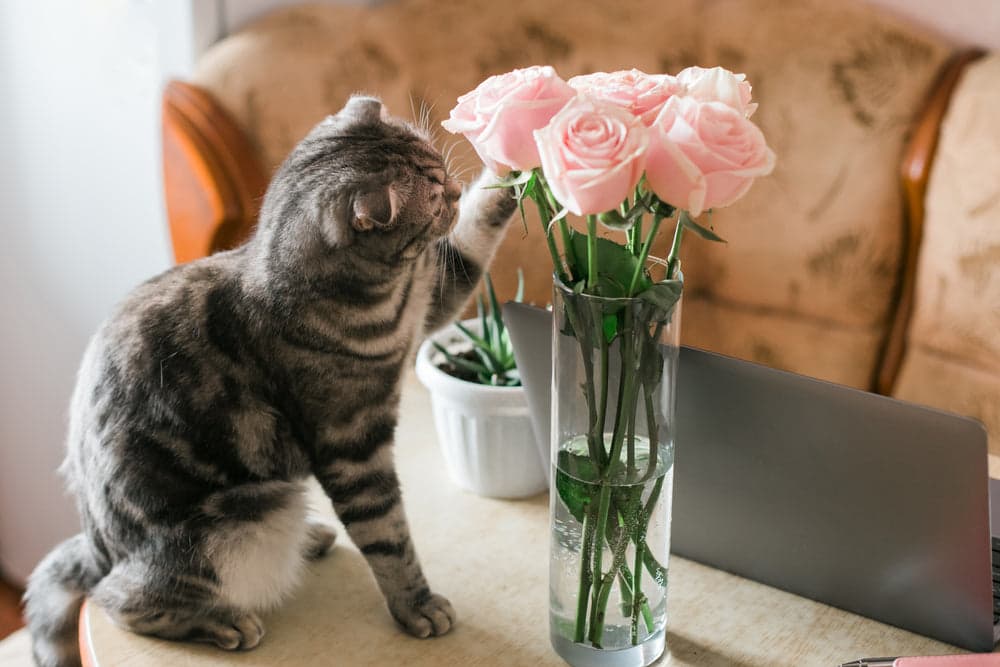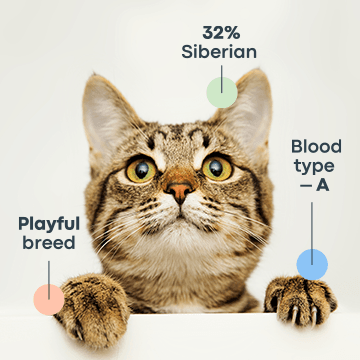Did you know that plants are in the top five categories of toxins that pets encounter? Unfortunately, some plants can be fatally toxic to cats. Luckily, if your cat has just eaten a rose, you can rest easy. The common rose is listed as non-toxic to cats by the ASPCA!
Are Roses Safe For Cats?
Roses are mostly safe for cats. The different parts of a rose, like the petals and leaves, are non-toxic to cats. But each rose has a thorny stem, and it may also have been sprayed with pesticides, which can be unsafe for our furry friends.
Rose petals, leaves, and stems
Upon sniffing the delightful fragrance of a rose, a cat may be tempted to taste it. Fortunately, roses are non-toxic to cats. So, you don’t need to worry about the petals, leaves, and stems of a rose poisoning a cat if they ingest it. But it may upset their stomach and make them feel sorry for themselves, as roses are likely something outside of your cat’s regular diet.
Thorns
Although the thorns of a rose are also non-toxic, a prick or scratch from a thorn could be painful and uncomfortable for a cat. Thorns can also hurt the inside of a cat’s mouth, lips, or face, especially if they chew on a thorny rose stem.
Pesticides

Roses may have been sprayed with chemicals to kill off insects and pests that eat them. These chemicals can be poisonous to cats if ingested, with painful indications. So, while roses themselves are mostly safe for cats, the pesticides that could be on them are not safe for our furry friends. Unfortunately, the pesticides can’t tell the difference between your cat and the pests for which it was designed to cause harm.
What To Do If Your Cat Eats A Rose And How To Prevent It
If your cat ate a plant that you’re concerned about, your veterinarian may first ask what type of plant it was. So, if you know that your cat has eaten a rose, this is a good starting point. Knowing that roses are non-toxic to cats is also important. More than this, vets working at the Pet Poison Helpline recommend that you:
Stop your cat from eating more roses.
Inspect your cat for physical injuries from thorns, like visible punctures and scratches.
Look out for excessive drooling, pawing at the mouth, lethargy, and lack of appetite, which may indicate injury.
Monitor your cat for symptoms that could result from eating parts of the rose, like vomiting and diarrhea, especially if they ate a lot of the rose.
Offering your cat some food they usually eat could also help minimize the chances of an upset stomach.
Look out for symptoms of poisoning from pesticides, which include vomiting, drooling, seizures, tremors, and lethargy.
If your cat does vomit, collect a sample to take with you to a vet. This is the most important point to be aware of—pesticides are meant to cause harm to creatures feasting on plants.
If you are concerned or if your cat shows symptoms like these, get help from a vet immediately. Especially if you suspect poisoning from pesticides, as it is best to consult with a professional as soon as possible.
If you’d like to prevent your cat from eating a rose, you could try:
Placing a physical barrier between your cat and the roses, which can be as simple as positioning a vase of roses on a shelf that your cat can’t reach.
Offering your cat an alternative plant to satisfy their munchies with, like catnip or cat grass. This could act as a distraction from the roses, so place them away from the roses. Also, take care that your cat eats the alternative option in moderation.
Training your cat to leave the roses alone by focusing their attention on other interesting items that they may like, or providing healthy treats in moderation or in food puzzles.

If your cat does not eat roses, but still enjoys playing with roses or in rose bushes, you could try cutting the sharp points off the thorns. In this way, your cat can smell the roses without suffering from the sharp bites that the thorns could inflict on them.
Other Plants That Can Be Dangerous To Your Cat
Although roses can be harmless, their namesakes may be poisonous to cats. There are many plants with the word “rose” in their name, which the ASPCA indicate as toxic to cats. The ASPCA also has photos of the plants on their list if you’d like to see what they look like. Be on the lookout for the toxic plants listed below if you’re a cat lover, and don’t forget about their additional common names!
Christmas Rose
A Christmas Rose bush appears to bloom white or pinkish-green flowers. Each flower has five petals that may nod down, with a centre of pollen-decorated stamen.
Scientific name: Helleborus niger
The Christmas Rose is also known as Hellabore, Lenten Rose, or Easter Rose.
Toxicity status for cats: Toxic
Desert Rose
A Desert Rose has five petals, each with a bright rim of pink. Each petal fades to white near the tube-shaped centre of the flower.
Scientific name: Adenium obesum
Other common names for the Desert Rose are Desert Azalea, Mock Azalea, Sabi Star, Impala Lily, or Kudu Lily.
Toxicity status for cats: Toxic
Moss Rose
Moss Roses wear layered, paper-like petals that are bright pink, orange, or red. Their centres have short, yellow, pollen-coated stamen.
Scientific name: Portulaca oleracea
Moss Rose can also be called Wild Portulaca, Rock Moss, Purslane, Pigwee, or Pusley.
Toxicity status for cats: Toxic
Primrose
The Primrose is a small, five-petalled flower. Each petal is pale yellow and heart shaped, appearing to have the point of the heart dipped in a darker yellow at the centre of the flower.
Scientific name: Primula vulgaris
Toxicity status for cats: Toxic
Rosebay
A Rosebay bush may have many ruffled, paper-like flowers that are bright pink and white in colour.
Scientific name: Rhododendron spp (several species)
Rosebay is also called by its scientific name Rhododendron, or Azalea.
Toxicity status for cats: Toxic
Rose Of Sharon
The five petals of a Rose of Sharon are cup-shaped with a deep pink centre. The deep pink can have short lines up each petal, which is mainly a pale pink or white in appearance. The centre contains a cluster of pollen-dusted stamen.
Scientific name: Hibiscus syriacus
Additional names for Rose of Sharon are Hibiscus and Rose of China.
Toxicity status for cats: Non-toxic
Conclusion
Common roses are non-toxic to cats, but each rose has its thorns. Even though common roses won’t poison your cat if your cat eats them, they could get upset tummies, hurt by the thorny stems, and suffer from severe symptoms from ingesting possible pesticides. As delectable as roses may smell to our furry friends, and enticing to taste, it may be safer to prevent your cat from eating them in the first place. And not all plants with the word “rose” in their name are safe for cats either. Be sure to look out for the toxic “rose” namesakes if you are a cat parent! Explore Basepaws blogs to learn about other plants that are toxic to your kitty, such as the snake plant.
Get Ahead Of Other Health Risks With Basepaws
Basepaws is here to help you get to know your kitty better—both inside and out—with our Breed + Health Cat DNA Test and Oral Health Test for Cats, which give you a comprehensive overview of every aspect of your cat's health. Get insight on 25 genetic traits associated with their unique appearance and behavior, as well as potentially life-saving information about their blood type and likelihood of resistance to Feline Immunodeficiency Virus (FIV).
In addition to 43 genetic diseases, Basepaws screens your cat's oral health for their current risk of having periodontal disease, halitosis, and tooth resorption. These painful issues are difficult to see, and poor oral health puts your feline friend at risk for heart, kidney, and other health conditions. Know what diseases your cat may be susceptible to, and how their oral health connects to their overall health, so that you can be proactive and support your cat’s wellness and help them live a better life, even longer!





